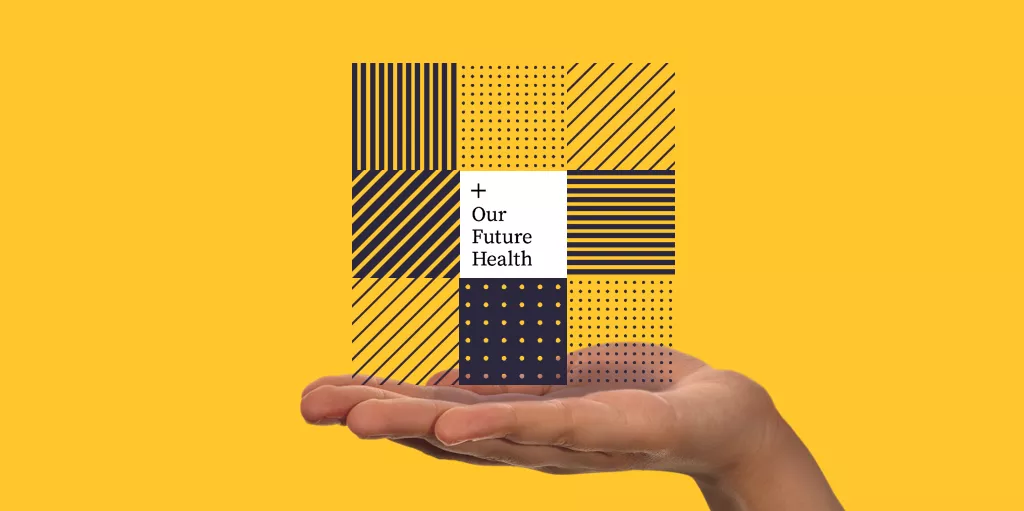
You're invited to take part in the UK's largest ever health research study and help researchers find out more about how to prevent health conditions earlier.
Our Future Health is a research programme to help discover new ways to prevent, detect and treat common conditions like diabetes, cancer and dementia. Here we hear from Our Future Health volunteers to find out why type 2 diabetes is motivating them to take part and what changes they hope this research will lead to.
The programme is bringing together up to five million volunteers aged 18 and over from across the country. That means it will be the UK’s largest-ever health research programme. And you're invited to take part.
Long-term health conditions like diabetes take a heavy toll on people’s physical and mental health. We need better ways to detect who is at risk of developing all types of diabetes, and why, so that we can prevent it from developing in the first place. We also need new ways to spot and prevent the complications of diabetes, to stop the harm the condition causes.
People volunteering to join Our Future Health are asked to fill out an online questionnaire about their lifestyle, give consent for the programme to link to their existing health records, provide a small sample of blood and have some physical measurements taken.
When taken together, the information will create an incredibly detailed picture of the nation’s health. Researchers will be able to analyse it to find new ways of tackling health conditions, so that future generations can live in good health for longer.
Our Future Health also offers volunteers the opportunity to get feedback on their health, including cholesterol and blood pressure checks. By joining the programme now, volunteers will have the option in the future to receive further feedback about their risk of disease.
Dealing with prediabetes
Vidya Potter, a preschool teacher from Croydon was diagnosed with prediabetes after a routine GP appointment but after making changes to her diet and lifestyle, her blood sugar levels are now in a healthy range.
“If Our Future Health can go even further to helping us identify risk factors that could help my kids, why wouldn’t I take part?”
A father’s hope for the future
Gavin Wood, a civil servant who lives in Saltaire, has a family history of type 2 diabetes.
“I signed up to Our Future Health because I was interested in being part of a wider study. If we can add to a body of data that improves medical science, that has to be a good thing. As a parent, I want to bring my kids up in a system grounded in science and research.”
Putting type 2 diabetes into remission
Dr Francis Andrews is Medical Director and Emergency Medicine Consultant at Bolton NHS Foundation Trust. During a health screening in 2019, Francis found out he had type 2 diabetes. Getting an early diagnosis gave him the chance to do something about it.
“Doctors were keen for me to take medication, but I discovered some fantastic research that showed weight loss could reverse type 2 diabetes.”
After losing 15kg in weight following a low-carb diet and exercising more, his type 2 diabetes went into remission.
“I’m a different person now in terms of energy levels and it’s helped my mental health, too.
“Thanks to that medical research I was able to change my lifestyle and massively reduce the risk to my future health by getting diagnosed early. That’s just one example of how medical research can improve our health outcomes.
“Our Future Health is a unique opportunity. The data will allow us to detect diseases much earlier than we do at the moment.”
Looking after yourself when you’re young
Chantelle Asiamah is a student midwife who lives in Croydon.
“My mum has type 2 diabetes that she developed later in life. I’ve always wondered if that’s something I could develop and I’m hoping this research will one day help me understand if there’s anything I can do to prevent it.
“As a young person, we often don’t focus much on what’s going on inside our bodies, but I think it’s important to know what’s happening so that we can prevent something happening in the future and counteract it while we’re still young. We think we’re young and carefree and we’ll take more care when we get older.”
Dr Elizabeth Robertson, Director of Research at Diabetes UK, said:
“We’re delighted to work with Our Future Health to support the development of this unparalleled health research programme, which aims to help researchers make new discoveries that will shape the future of how we prevent and treat diabetes, and other serious long term health conditions, in the UK.
“We want a new and different future for people living with, or at risk of, diabetes. Our Future Health will play an important role in speeding up research progress so we can create a detailed picture of how and why the condition develops and how to stop it in its tracks.”
